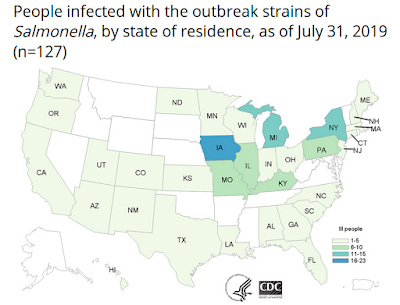 |
| CREDIT CDC |
#14,221
Three months ago, in CDC: The 8 Zoonotic Diseases Of Most Concern In The United States, we looked at a joint CDC, USDA, DOI report on the top (n=56) zoonotic diseases of national concern for the United States. Of these 56 diseases examined, 8 were selected as being of particular concern in the United States.
The zoonotic diseases of most concern in the U.S. are:While zoonotic (i.e., swine, avian, etc.) influenza tops the list - due to its potential impact - coming in second place is Salmonellosis, which the CDC estimates causes about 1.2 million illnesses, 23,000 hospitalizations, and 450 deaths in the United States every year.
- Zoonotic influenza
- Salmonellosis
- West Nile virus
- Plague
- Emerging coronaviruses (e.g., severe acute respiratory syndrome and Middle East respiratory syndrome)
- Rabies
- Brucellosis
- Lyme disease
In the past we've looked at outbreaks linked to baby chicks and ducklings, backyard poultry, pet turtles and reptiles, ground meat, sprouts, and even peanut butter.
Because many illness are mild, or self limiting and of short duration, most cases go unidentified (see chart below).
Photo Credit CDC
Some cases are severe, however, and some strains are multi-drug resistant. The CDC is currently investigating 5 Salmonella Outbreaks across the country, 1 linked to food, 3 linked to animals, and 1 laboratory exposure (from 2017).
Reports of Active Salmonella Outbreak Investigations
Outbreak Investigations Linked to Food
Outbreak Investigations Linked to Animals
- Papayas – Salmonella Uganda
Other Outbreaks
- Backyard Poultry – Salmonella Infections
- Pet Hedgehogs – Salmonella Typhimurium
- Pig Ear Dog Treats– Salmonella I 4,[5],12:i:-
- Clinical and Teaching Microbiology Laboratory Exposure – Salmonella Typhimurium
The largest of the outbreaks involves backyard poultry, and was updated on Jul 19th.
- Since the last update on June 13, 2019, illnesses in an additional 489 people and eight states have been added to this investigation. Five additional Salmonella serotypes have also been added.
- A total of 768 people infected with the outbreak strains of Salmonella have been reported from 48 states.
- 122 (29%) people have been hospitalized and two deaths have been reported, one from Texas and one from Ohio.
- 156 (24%) illnesses occurred among children younger than 5 years.
- Epidemiologic and laboratory evidence indicate that contact with backyard poultry, such as chicks and ducklings, from multiple hatcheries are the likely source of these outbreaks.
- In interviews, 237 (75%) of 315 ill people reported contact with chicks or ducklings.
- People reported getting chicks and ducklings from several sources, including agricultural stores, websites, and hatcheries.
- Five of the outbreak strains making people sick have been identified in samples collected from backyard poultry environments in four states. The sampling was from backyard poultry environments in ill people’s homes in California and Ohio and from poultry environments at retail stores in Michigan and Oregon.
- Backyard poultry from multiple hatcheries are the likely source of these outbreaks. Regardless of where poultry are purchased, they can carry Salmonella germs that can make people sick. Backyard poultry owners should always follow steps to stay healthy around their poultry.
Comparatively speaking, the outbreaks involving Hedgehogs and Papayas are much smaller.
The newest outbreak investigation was started in early July (see CDC: Multidrug-Resistant Salmonella Infections Linked to Pig Ear Dog Treats), and yesterday the CDC released updated numbers along with a new warning not to buy, or use existing, pig-ear dog treats.
Salmonella Outbreaks Linked to Pig Ear
Media Advisory
Embargoed Until: Wednesday, July 31, 2019, 1:00 p.m. ET
Contact: Media Relations
(404) 639-3286
A CDC update regarding a multistate outbreak of Salmonella illness linked to contact with pig ear dog treats has been posted at https://www.cdc.gov/salmonella/pet-treats-07-19/index.html.
- CDC and FDA are now advising people not to buy or feed any pig ear dog treats, including any already in homes, to dogs because they could be contaminated with Salmonella.
About Salmonella:
- Handling these treats could make people sick; eating the treats could make dogs sick.
- Product testing has identified many different strains of Salmonella in pig ears from various brands and suppliers.
- Information collected to date about where ill people bought pig ears has not identified a single supplier, distributor or common brand of pig ear treats.
- Since the last update on July 17, 2019, 34 ill people have been added to this investigation.
- 127 ill people have been reported from 33 states, including 26 people who have been hospitalized.
- No deaths have been reported.
- Do not feed pig ears to your dog. Throw them away in a secure container so that your pets and other animals can’t eat them.
- Always wash your hands thoroughly with soap and water after handling pet food or treats, including pig ears.
- This investigation is ongoing and CDC will provide more information as it becomes available.
- Most people infected with Salmonella develop diarrhea, fever, and stomach cramps 12-72 hours after eating contaminated food.
- The illness usually lasts 4 to 7 days, and most people recover without treatment.
- See your healthcare provider if you are concerned about symptoms, such as a high fever (temperature over 102˚F), blood in your poop, diarrhea, or frequent vomiting that prevents keeping liquid down.
- More information on pet food safety can be found at https://www.cdc.gov/healthypets/publications/pet-food-safety.html.
- If you have questions about cases in a particular state, please call that state’s health department.
While we tend to focus on the exotic epidemic disease threats like MERS-CoV, Avian Flu, or Zika - in truth - the annual burden of disease from `lesser' bacterial zoonotic threats - like Salmonella, Listeria, and E. coli - should not be underestimated.
Fortunately, many of these illnesses are preventable. Practicing good hand hygiene, and following some common sense precautions can significantly lower your risk of infection.


